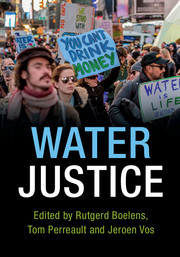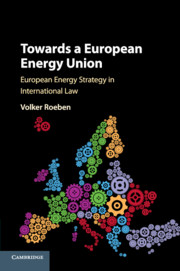Refine listing
Actions for selected content:
2285 results in Ebooks in ecology and environment
14 - Sharing Our Water
- from Part III - Exclusion and Struggles for Co-Decision
-
-
- Book:
- Water Justice
- Published online:
- 26 February 2018
- Print publication:
- 15 March 2018, pp 259-274
-
- Chapter
- Export citation
Part IV - Governmentality, Discourses and Struggles over Imaginaries and Water Knowledge
-
- Book:
- Water Justice
- Published online:
- 26 February 2018
- Print publication:
- 15 March 2018, pp 275-360
-
- Chapter
- Export citation
Contents
-
- Book:
- Water Justice
- Published online:
- 26 February 2018
- Print publication:
- 15 March 2018, pp v-vii
-
- Chapter
- Export citation
Contributors
-
- Book:
- Water Justice
- Published online:
- 26 February 2018
- Print publication:
- 15 March 2018, pp viii-xiv
-
- Chapter
- Export citation
2 - Water Governance as a Question of Justice
- from Part I - Re-Politicizing Water Allocation
-
-
- Book:
- Water Justice
- Published online:
- 26 February 2018
- Print publication:
- 15 March 2018, pp 43-58
-
- Chapter
- Export citation
17 - The Meaning of Mining, the Memory of Water
- from Part IV - Governmentality, Discourses and Struggles over Imaginaries and Water Knowledge
-
-
- Book:
- Water Justice
- Published online:
- 26 February 2018
- Print publication:
- 15 March 2018, pp 316-329
-
- Chapter
- Export citation
3 - Water Grabbing: Practices of Contestation and Appropriation of Water Resources in the Context of Expanding Global Capital
- from Part I - Re-Politicizing Water Allocation
-
-
- Book:
- Water Justice
- Published online:
- 26 February 2018
- Print publication:
- 15 March 2018, pp 59-70
-
- Chapter
- Export citation
16 - Critical Ecosystem Infrastructure?
- from Part IV - Governmentality, Discourses and Struggles over Imaginaries and Water Knowledge
-
-
- Book:
- Water Justice
- Published online:
- 26 February 2018
- Print publication:
- 15 March 2018, pp 302-315
-
- Chapter
- Export citation
9 - Large-Scale Dam Development and Counter Movements
- from Part II - Hydrosocial De-Patterning and Re-Composition
-
-
- Book:
- Water Justice
- Published online:
- 26 February 2018
- Print publication:
- 15 March 2018, pp 169-186
-
- Chapter
- Export citation
1 - Introduction: The Multiple Challenges and Layers of Water Justice Struggles
-
-
- Book:
- Water Justice
- Published online:
- 26 February 2018
- Print publication:
- 15 March 2018, pp 1-32
-
- Chapter
-
- You have access
- HTML
- Export citation
Part III - Exclusion and Struggles for Co-Decision
-
- Book:
- Water Justice
- Published online:
- 26 February 2018
- Print publication:
- 15 March 2018, pp 187-274
-
- Chapter
- Export citation
19 - Conclusions: Struggles for Justice in a Changing Water World
- from Part IV - Governmentality, Discourses and Struggles over Imaginaries and Water Knowledge
-
-
- Book:
- Water Justice
- Published online:
- 26 February 2018
- Print publication:
- 15 March 2018, pp 346-360
-
- Chapter
- Export citation
5 - Urban Water and Sanitation Injustice
- from Part I - Re-Politicizing Water Allocation
-
-
- Book:
- Water Justice
- Published online:
- 26 February 2018
- Print publication:
- 15 March 2018, pp 89-106
-
- Chapter
- Export citation
Introduction: Exclusion and Struggles for Co-Decision
- from Part III - Exclusion and Struggles for Co-Decision
-
-
- Book:
- Water Justice
- Published online:
- 26 February 2018
- Print publication:
- 15 March 2018, pp 188-192
-
- Chapter
- Export citation
11 - Sanitation Justice?
- from Part III - Exclusion and Struggles for Co-Decision
-
-
- Book:
- Water Justice
- Published online:
- 26 February 2018
- Print publication:
- 15 March 2018, pp 210-225
-
- Chapter
- Export citation
18 - New Spaces for Water Justice?
- from Part IV - Governmentality, Discourses and Struggles over Imaginaries and Water Knowledge
-
-
- Book:
- Water Justice
- Published online:
- 26 February 2018
- Print publication:
- 15 March 2018, pp 330-345
-
- Chapter
- Export citation
4 - De-Politicized Policy Analysis: How the Prevailing Frameworks of Analysis Slight Equity in Water Governance
- from Part I - Re-Politicizing Water Allocation
-
-
- Book:
- Water Justice
- Published online:
- 26 February 2018
- Print publication:
- 15 March 2018, pp 71-88
-
- Chapter
- Export citation
15 - Neoliberal Water Governmentalities, Virtual Water Trade, and Contestations
- from Part IV - Governmentality, Discourses and Struggles over Imaginaries and Water Knowledge
-
-
- Book:
- Water Justice
- Published online:
- 26 February 2018
- Print publication:
- 15 March 2018, pp 283-301
-
- Chapter
- Export citation

Water Justice
-
- Published online:
- 26 February 2018
- Print publication:
- 15 March 2018

Towards a European Energy Union
- European Energy Strategy in International Law
-
- Published online:
- 01 February 2018
- Print publication:
- 25 January 2018
